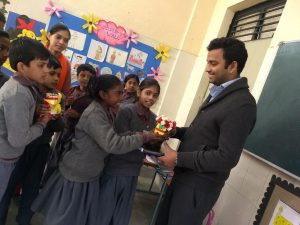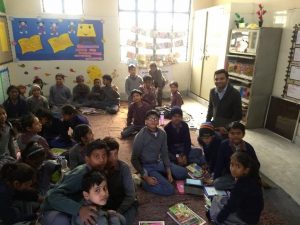For Satyam Sidharth, MBA was a choice that he made after his initial work experience that gave him a flavor of the importance of critical thinking. Post his MBA with XLRI, Satyam got into TAS and worked in different Tata Group companies for the year-long stint. In our final #SettleForMore story, we today have Satyam Sidharth, who chose a career in general management over consulting and joined TCS as Business Development Manager. He currently works at TCS UK and Ireland, where he is responsible for acquiring new clients. Here are the excerpts from the interview:
Tell us a little about your growing up years. From deciding to do Mechanical Engineering to working with ZS for two years and finally opting for an MBA from XLRI? What led you to these choices?
During my childhood and teenage years, I was an automotive enthusiast. I enjoyed building solutions for day-to-day problems and as I grew up, I also developed an interest in robotics. So mechanical engineering came to me as a natural choice for my graduation specialization.
During my engineering days, I got myself involved with coordinating placement for my batchmates and leading sponsorship drives for my college festival which helped me greatly in developing an inclination towards management and I decided to gain some business experience before applying for an MBA. I got placed with ZS Associates as a Business Analyst in the customer insights division. My experience with ZS developed my skills in problem-solving, critical thinking, and advanced analytics and further reinforced my decision to go to a B-school for an MBA degree.
I was fortunate to be selected for the Business Management program at XLRI where I specialized in Marketing and Finance but it ensured an optimal course coverage across other domains such as Operations, Strategy, etc. as well.
In your summers, you were a part of the Boston Consulting Group. From consulting to general management, how did the shift in interest take place?
My internship with BCG was quite an interesting experience where I worked with the Govt. of India on a project related to value engineering (reducing time & cost) of bridge construction. My consulting experience at BCG and previously at ZS Associates taught me a great deal of critical thinking and problem-solving.
What interested me in a career in general management is the flexibility of roles on offer where you can get exposure to a multitude of functions and industries. It also enables more autonomy and accountability for your work, which leads to well-rounded professional development.
Looking back, It worked out best for me as I was able to build on the learnings of consulting, my MBA experience and blend it with the rigor of general management in my current role.
From your experiences as a student of XLRI or during your field trips as part of the TAS stint, tell us about a story that stayed with you?
I have some amazing memories from my first year of the TAS program. My experiences varied from hitchhiking a ride with truck drivers to understand their behaviors while I was working for Tata Motors to staying in a Titan Eyewear retail store right from the moment it opened to that of it getting shut, just to understand consumer behavior better.
However, my fondest memory is from my stint at Tata Trusts where I was helping primary schools setting up libraries to improve their opportunities to learn from diverse sources. I was working in a remote district in Rajasthan interacting with school children, teachers, and relevant stakeholders. It was also the time when I was feeling a bit down personally, due to a recent fracture on my right hand.
On one of my visits to the school, the kids gave me the best surprise welcome ever with get well soon cards, paper flowers, crown, paintings, and recital of their favorite poems. This incident didn’t just make my day then, but still puts a smile on my face whenever I am going through challenging times in life.


My journey with business development so far has been challenging yet truly rewarding. It has given me exposure across various technologies, industries, and geographies to challenge my potential and bring the best out of me.
For the major part of my first 2 years into the role, I was helping set up an IoT-based product for TCS. The whole journey of setting up the product from scratch, working on its roadmap and strategy, launching it in international markets, getting our first customer, scaling it across various geographies and industries has provided me with a plethora of experience to fall back and helped me build a solid foundation.
In my current role, I help increase TCS footprint in the manufacturing industry in UK & Ireland. Right from building relationships to constantly striving to bring value for your prospects, this role has challenged me equally. The added complexity of COVID 19 challenges me to keep finding innovative ways to connect, add value, and build relationships.
What does the word ‘Settle For More’ mean to you at TAS and how do you connect with the philosophy of the Tatas?
I am privileged to be a part of the Tata group which puts ‘ethics and greater good’ at the forefront. Working for such an organization, which puts two-thirds of its profit back to the community, is a matter of great pride for me. While the world is now rising to the concept of ‘Stakeholder Capitalism’, Tata group has continuously been adding value to all its stakeholders: customers, employees, and the community for more than a century.
As a TAS Manager, ‘Settle for More’ means, stretching outside my comfort zone, pushing the envelope a bit more each time, and challenging myself in bringing out innovative solutions to change the ‘business as usual’.
A mechanical engineer, working now with analytics, business, and technology consulting, cybersecurity, IoT. How has life changed for good for you and what is in store for the future?
Well, it has been a whirlwind of experiences. I’ve been fortunate enough to be part of some amazing teams and learn from my peers and their experiences. There have been a lot of sleepless nights and fierce debates along with way which has played a critical role in evolving my thought process.
I would like to continue to hone my critical thinking and problem-solving skills. In the foreseeable future, I would like to continue in the field of business development and grow further as a leader.
Any message that you want to convey to students who would love to have a career trajectory like you in the coming years?
My advice to anyone starting their career would be to keep an open mind and be ready to constantly learn, unlearn and relearn. It is also very important to enjoy what you do and invest in meaningful professional relationships both at work as well as outside of it.
